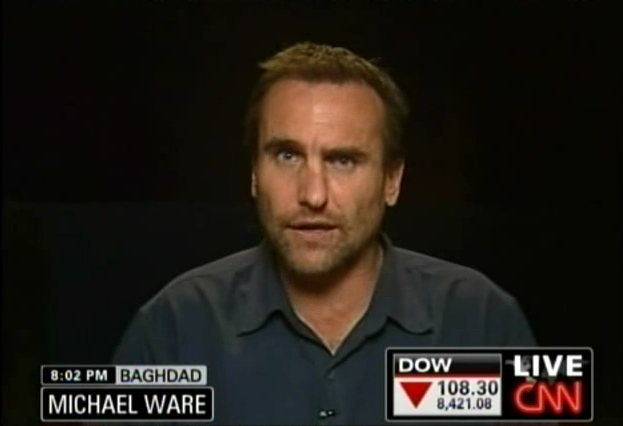NR: " 'Let us do it in the Iraqi way.' "
June 30, 2009

Length: 5:14
LARGE (60.6 MB) ----- SMALL (6.4 MB)
With his voice giving out from the hours of reporting and the sandstorm onslaught, Michael gives another recap of the changes wrought by the handover.
KYRA PHILLIPS: Hopes and fears meeting head-on right now in Iraq, on this day when U.S. troops complete their pullback from Iraqi cities and towns. Insurgents respond in deadly ways. In Kirkuk, at least 25 people killed; at least twice that number hurt in the latest bombing. Houses, shops destroyed. The bombing is just the latest in a series over the last ten days that have left hundreds of people dead in that country, including four of our U.S. soldiers that were killed yesterday.
Iraq's renewed sense of national pride coming with a cost. Still, the American military believes Iraqi police and soldiers can handle it all.
(BEGIN VIDEO CLIP)
GEN. RAYMOND ODIERNO, COMMANDER, MULTI-NATIONAL FORCES IN IRAQ: We've been out of the cities, a large majority of the cities now, for the last eight months. So, it's really only Mosul and the last remnants that we've had in Baghdad that have pulled out over the last few weeks. So we've actually been implementing this in many parts of Baghdad for a long time. And they understand what their mission is. They understand what we expect them to do.
(END VIDEO CLIP)
PHILLIPS: Well, things are playing out just like many Iraqi and American politicians and military types had predicted. We've got the story covered in Baghdad with our Michael Ware and also CNN's Atia Abawi is in Afghanistan. Some troops leaving Iraq will end up there at some point on a new assignment.
Michael, let's go ahead and go to you first. What do you think? Do U.S. troops there really think that Iraq's police and military are ready for this?
MICHAEL WARE, CNN CORRESPONDENT: Well, Kyra -- excuse me. Kyra, that's a yes and a no answer. In a vacuum, the Iraqi security forces simply are not yet up to this fight. There's hundreds and thousands of them in the Iraqi Army, the police, the national police. But their loyalties can be at question. Their equipment also may not be up to what they need.
And their procedures: despite endless hours of American training, they insist on doing it the way they prefer. And that's the way they knew under Saddam.
So, yes, can they hold the line right now? They can. General Ray Odierno is correct. But that's only because 130,000 American combat troops are still here on the ground.
Now, as you say, they've pulled out of the cities and retreated to pre-designated bases outside of the populated centers. They're not far away. But they cannot operate on their own in the urban environment, which, as you know, has been the heart of this war. They're in a supporting role, the U.S. forces. They must either ask for the Iraq's government permission to act, or they have to wait for an invitation.
Nonetheless, it's their presence, their helicopters, their air power, their heavy weaponry that's underwriting or acting as the insurance for these still rather nascent Iraqi security forces to hold the line against this bombing campaign that's been going for years.
This is being conducted not by the insurgency. The insurgency's playing a political game. This is being done by the extremists. In this case, these hideous bombings like the one we've just seen that's killed 30 -- 30 -- and many of them women and children by al Qaeda in Iraq and its allies, who are trying to return Iraq to sectarian civil war.
Meanwhile, you have Iranian-backed extremists, Shia militants, who are still lobbing missiles and rockets on their U.S. embassy and the Green Zone. The Iraqi security forces alone can't bring that to an end as it stands, Kyra.
PHILLIPS: And you bring up such a good point. You talk about still this cultural difference of what you have to fight a war that many of these Iraqis haven't -- have never had to deal with before. I mean, you've talked to Iraqis; I've talked to Iraqis. They've said, you know, "We never knew how to deal with a terrorist until this war started." So, what are the Iraqis telling you? What are the members of the police and the Iraqis you know that live there and members of the military? I mean, do they think they can handle this? Or are they scared to death to lose U.S. troops, who are still training them?
WARE: Some feel positive, rightly or wrongly, they can handle this. "Let us do it in the Iraqi way," is what they say.
And, Kyra, I think you know as well as I do what they mean by that. Either way, even those who are a bit more realistic or a bit less callous, shall we say, there's a point where they don't care. People are just so happy that the U.S. phase of this war, the U.S.-led phase, is over. No matter how you look at it, to the Iraqis, it's been a foreign occupation. That's now over. And if the price of that is they have to face the militants alone, by and large, despite the apprehension, they're ready to pay that price, Kyra.
PHILLIPS: Michael Ware, I know it's been a long day and a long night for you. Appreciate you staying up for us.
WARE: Yes.
